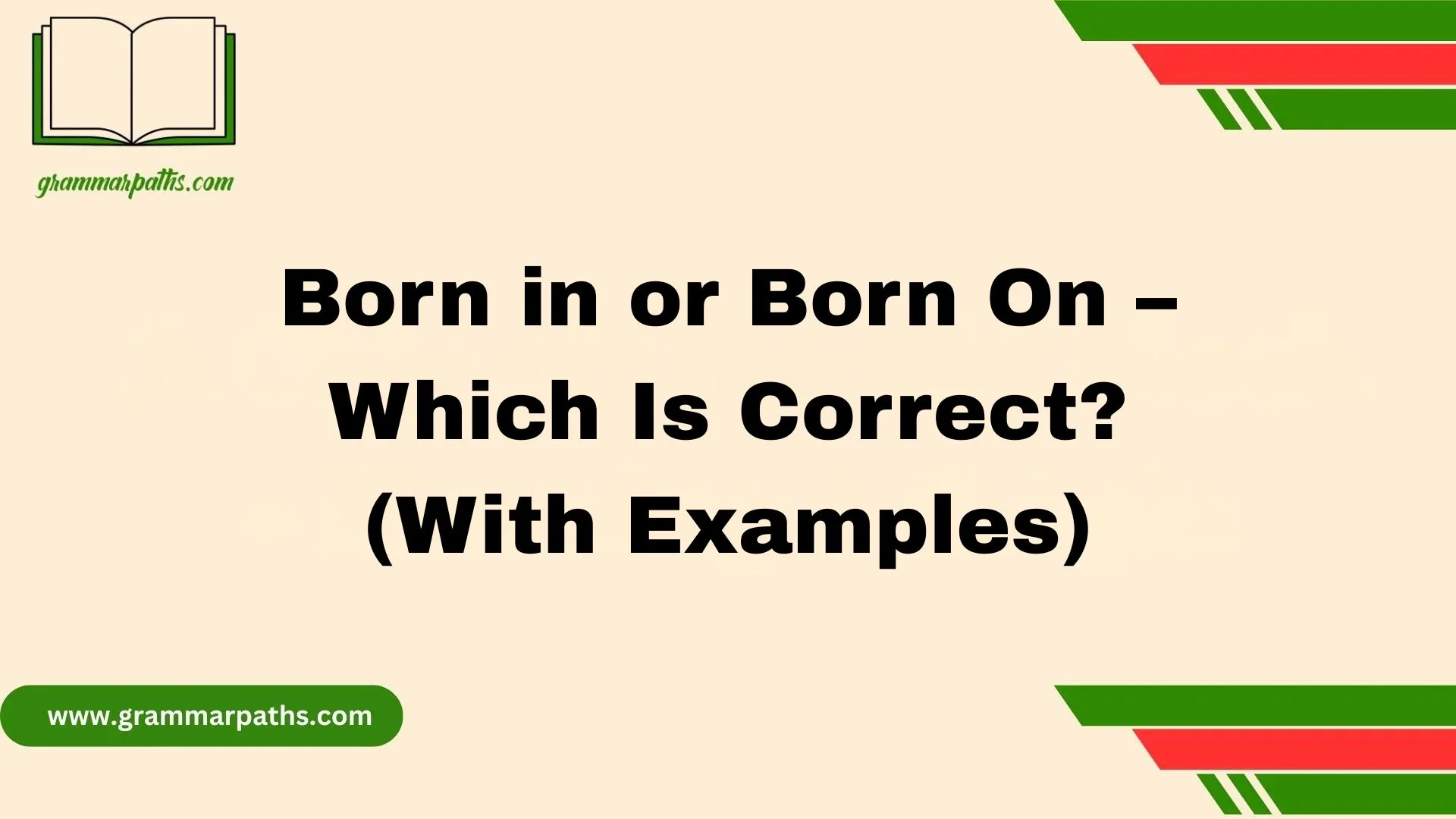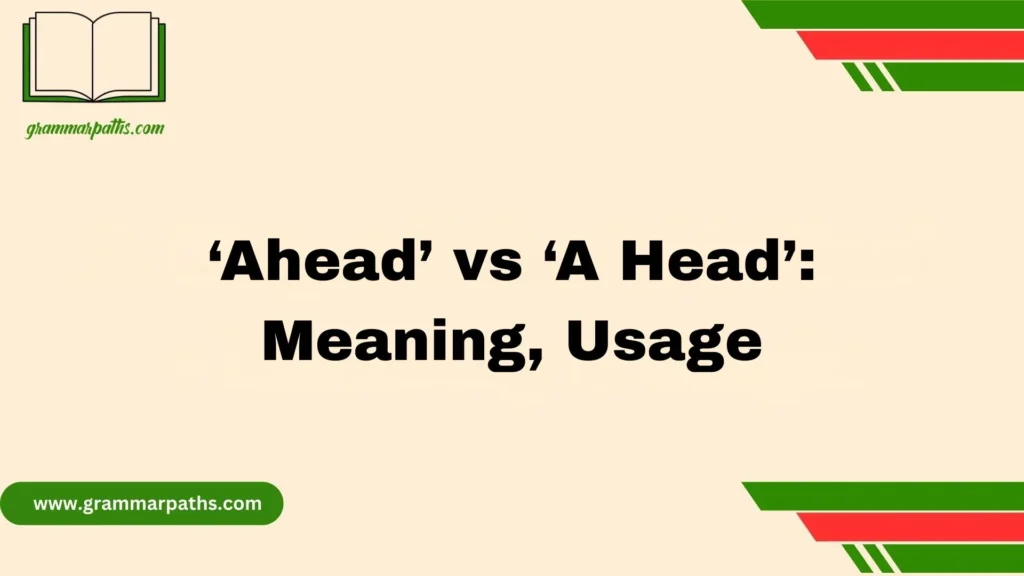When it comes to English grammar, small details often cause big confusion. One common example is the use of “born in” and “born on.” Both phrases are grammatically correct, but they are used in different contexts. Many learners of English get stuck wondering which is right when talking about birth dates, birth months, or birth years. Understanding this difference can help you communicate more clearly and confidently.
The phrase “born in” is typically used with months, years, decades, or places. For example, you might say, “She was born in 1995” or “He was born in New York.” On the other hand, “born on” is used when referring to a specific day or date. For instance, “I was born on July 10th” or “He was born on a Monday.” Knowing when to use each phrase is essential for proper grammar and spoken English.
This guide will explain the difference between “born in” vs. “born on,” provide simple rules, and share practical examples you can use in everyday life. By the end, you’ll have a clear understanding of how to use these phrases without hesitation.
Understanding the Grammar of ‘Born in’ vs. ‘Born on’
Prepositions are tricky in English because they don’t always translate directly from other languages. “Born in” and “born on” follow specific grammatical patterns:
- Born in → used for years, months, seasons, and places
- Born on → used for specific days and dates
Think of it like this: “in” is for broader periods or locations, while “on” pinpoints an exact moment in time. Misusing them changes how your sentence feels and can confuse readers.
| Preposition | Usage | Example |
| Born in | Year, month, season, place | She was born in 1995. |
| Born on | Specific date or day | He was born on July 4, 2000. |
Using ‘Born in’ for Time
Years
When you refer to the year someone was born, “in” is always correct:
- Albert Einstein was born in 1879.
- Oprah Winfrey was born in 1954.
Using “on” with a year sounds unnatural: “She was born on 1995” is incorrect.
Months
Months also pair with “in” because they represent a broader period than a specific day:
- He was born in December.
- The famous actor was born in May.
Seasons
Seasons are longer spans, so “in” is mandatory:
- They were born in summer.
- Many people are born in spring.
Tip: Think of “in” as enclosing a time frame rather than pointing to a single date.
Using ‘Born on’ for Specific Dates
Days of the Week
Use “on” when specifying the day of the week:
- She was born on Monday.
- He was born on Friday, just before the weekend.
Full Dates
When you mention an exact date, “on” is required:
- Barack Obama was born on August 4, 1961.
- Princess Diana was born on July 1, 1961.
Special Occasions
Births that coincide with holidays or commemorative days also use “on”:
- He was born on Christmas Day.
- She was born on New Year’s Eve.
Quick Memory Tip: If you can point to the day on a calendar, it’s “on.”
| Situation | Correct | Incorrect |
| Year | Born in 1990 | Born on 1990 |
| Month | Born in March | Born on March |
| Day | Born on Friday | Born in Friday |
| Date | Born on July 4, 2000 | Born in July 4, 2000 |
Using ‘Born in’ for Places
Places are also a strong domain for “in.” It doesn’t matter whether it’s a country, city, or region:
- Born in the United States
- Born in Paris, France
- Born in the Midwest
Regional Clarifications
- For buildings or small locations, English sometimes uses “at”:
- Born at St. Mary’s Hospital (specific building)
- Born in London (city or general location)
Rule of thumb: Use “in” for broad locations, “at” for exact places.
Contextual Nuances in Usage
English isn’t always rigid, and context matters. Some sentences may feel like they allow either preposition but only one sounds natural:
- She was born in July 4, 2000.
- She was born on July 4, 2000.
Formal vs. Informal Usage
- Biographies and official records stick strictly to rules.
- Casual speech sometimes bends rules slightly, but writing requires precision.
Example:
- Informal: “I was born on summer.”
- Correct: “I was born in summer.”
Common Mistakes and Misconceptions
Even advanced English speakers make mistakes with born in vs. born on. The most frequent errors include:
- Using on for months or seasons.
- Using in for specific dates.
- Confusing at and in for small vs. large places.
Table of Common Errors
| Mistake | Correct Usage | Explanation |
| Born on July | Born in July | Months are not specific days |
| Born in Monday | Born on Monday | Days require “on” |
| Born at Paris | Born in Paris | Cities take “in” |
| Born on winter | Born in winter | Seasons use “in” |
Real-Life Examples and Case Studies
Celebrity Biographies
- Taylor Swift was born on December 13, 1989, in Reading, Pennsylvania
- Incorrect: Taylor Swift was born on December 1989, at Reading.
Social Media Misuse
Many users post: “I was born on July” on Instagram. Properly, it should be “I was born in July.”
Case Study
A newspaper article once wrote: “The famous artist was born on 1972 in New York.”
Correction: “The famous artist was born in 1972 in New York.”
Explanation: Year = in, place = in.
Influence of Popular Culture
Movies, biographies, and social media captions often influence preposition use. Some trends:
- Informal captions may drop the preposition entirely: “Born July 4”
- Movies and documentaries maintain strict grammar for clarity.
Tip: Always follow formal English rules in writing, but understand that casual speech can be flexible.
Tips to Remember the Rules Easily
- Mnemonic: “In for long, on for exact.”
- Time Frames: Years, months, seasons = in
- Exact Dates: Days, full dates = on
- Places: Countries, cities, regions = in; specific buildings = at
Quick Checklist
- Is it a year, month, season, or place? → Born in
- Is it a day of the week, date, or holiday? → Born on
- Is it a specific building or hospital? → Born at
Conclusion
The difference between “born in” and “born on” may seem small, but it plays a big role in using correct English grammar. The phrase “born in” is used for months, years, decades, centuries, and places, while “born on” is used for specific days or dates. Remembering this simple rule will make your sentences sound natural and professional in both spoken English and written English.
By practicing with real-life examples, you can quickly master this usage. Whether you’re filling out a form, writing a biography, or introducing yourself, choosing the right phrase will ensure your communication is clear and correct.
FAQs
Q1: Is it correct to say “I was born in July 5”?
No, it should be “I was born on July 5” because it refers to a specific date.
Q2: Can I use “born in” for places?
Yes, you can. For example: “She was born in London.”
Q3: When should I use “born in”?
Use born in for months, years, decades, centuries, and locations. Example: “He was born in 1990.”
Q4: When should I use “born on”?
Use born on for specific days or dates. Example: “I was born on Monday.”
Q5: Which is more common in everyday English?
Both are common, but it depends on the context—whether you’re talking about a date or a time period/place.

Grace Marie is the dedicated writer behind GrammarPaths.com, where she shares her passion for English grammar, idioms, and writing mastery. With a strong background in language studies and years of experience helping learners improve their communication skills, Grace creates clear, practical, and engaging content that makes English easy to understand.












